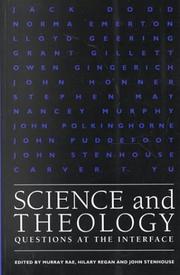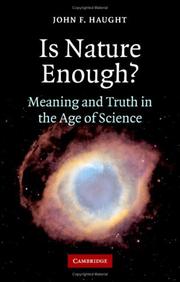| Listing 1 - 6 of 6 |
Sort by
|
Book
ISBN: 0773555625 0773555617 9780773555617 9780773555624 9780773554436 0773554440 9780773554443 Year: 2018 Publisher: Montreal Kingston London Chicago
Abstract | Keywords | Export | Availability | Bookmark
 Loading...
Loading...Choose an application
- Reference Manager
- EndNote
- RefWorks (Direct export to RefWorks)
A compelling exploration of a new epistemic framework for Christian ethical thinking.
Religion and science. --- Christianity and science --- Geology --- Geology and religion --- Science --- Science and religion --- Religious aspects --- 215 --- 241.65*7 --- 234.23 --- 234.23 Geloof en wetenschap. Openbaring en rede --- Geloof en wetenschap. Openbaring en rede --- 215 Godsdienst en wetenschap --- 215 Religion et science --- Godsdienst en wetenschap --- Religion et science --- 241.65*7 Theologische ethiek: natuur; ecologie --- Theologische ethiek: natuur; ecologie
Book
ISBN: 1608337243 9781608337248 9781626982598 1626982597 Year: 2017 Publisher: Maryknoll
Abstract | Keywords | Export | Availability | Bookmark
 Loading...
Loading...Choose an application
- Reference Manager
- EndNote
- RefWorks (Direct export to RefWorks)
God (Christianity) --- Philosophy and religion --- Catholic Church and philosophy --- Religion and science --- 215 --- 215 Godsdienst en wetenschap --- 215 Religion et science --- Godsdienst en wetenschap --- Religion et science --- Philosophy and the Catholic Church --- Christianity and science --- Geology --- Geology and religion --- Science --- Science and religion --- Christianity and philosophy --- Religion and philosophy --- Religion --- Christianity --- Trinity --- Religious aspects --- Philosophy and religion. --- Catholic Church and philosophy. --- Religion and science.
Book
ISBN: 9780231179041 0231179049 9780231546775 0231546777 Year: 2018 Publisher: New York
Abstract | Keywords | Export | Availability | Bookmark
 Loading...
Loading...Choose an application
- Reference Manager
- EndNote
- RefWorks (Direct export to RefWorks)
"With the advent of the modern cognitive neurosciences, along with anthropological and historical research, the scientific study of religious and spiritual phenomena has become far more sophisticated and wide-ranging. It suggests answers as to how and why religion became so prominent in human societies and in human consciousness. Neurotheology--a term coined by Aldous Huxley in 1962 in his novel Island and introduced into the scientific literature in the 1990s by Newberg and others--explores some of the most controversial positions including the argument that religion was a necessary condition of cohesive societies, morality, and a sense of purpose. The book considers brain development from an evolutionary perspective and assesses how religious and spiritual beliefs and experiences arose and whether such evolutionary evidence eliminates the need for a religious explanation. Newberg demonstrates that religious beliefs and emotions can be both beneficial and detrimental in people's lives. For some, religion provides a means toward compassion, openness, and understanding; others turn to highly destructive acts, as is the case with suicide bombers. What is happening in the brains of such people? Are they pathological? And what of practices such as meditation, prayer, and the ingestion of psychoactive substances? Neuroimaging studies can show how these practices affect people in the moment and over a lifetime. Finally, the book investigates the deeper implications of a neurotheological approach. Does the neuroscientific study of religion negate any or all of the truth claims of religion? How does neurotheology address the "big questions" such as: What is the meaning of life? Why are we here? And what is the true nature of reality?"--
Neurophysiology --- Brain --- Spirituality --- Psychology, Religious --- Religion --- Prayer --- Religious Beliefs --- Religious Ethics --- Beliefs, Religious --- Ethic, Religious --- Prayers --- Religions --- Religious Belief --- Psychology of religion --- Religious psychology --- Spiritual-mindedness --- Cerebrum --- Mind --- Nervous system --- Religious aspects --- Psychological aspects --- Psychology --- Physiology --- Spiritual Therapies --- Secularism --- Psychology and religion --- Philosophy --- Spiritual life --- Central nervous system --- Head --- Neurobiology --- 215 --- 215 Godsdienst en wetenschap --- 215 Religion et science --- Godsdienst en wetenschap --- Religion et science --- Neurophysiologie. --- Neurosciences. --- Psychology, Religious. --- Religion and Science. --- Religion. --- Spirituality. --- Theology. --- Physiology. --- Religious aspects.

ISBN: 9781474281522 1474281524 9781474281539 9781474292986 0567292657 1474293476 1474281532 9780567292650 9781474281553 9781474281546 9781474281386 Year: 2018 Publisher: London : Bloomsbury Publishing,
Abstract | Keywords | Export | Availability | Bookmark
 Loading...
Loading...Choose an application
- Reference Manager
- EndNote
- RefWorks (Direct export to RefWorks)
"In popular culture, science and theology have often been portrayed as antagonistic. Some writers have described the history of the debate in terms of a surrender by theology, a retreat from the field of engagement: theology has abandoned the public arena, leaving all creation to science, and has opted instead for the safer ground of ethics, morality and personal or private belief. Science and Theology advocates a constructive dialogue between the two subjects and suggests the topics where they might meet. The essays in this volume were commissioned from leading figures around the world - experts in their own disciplines, but enthusiasts for debate at the science and theology interface. They include Norma Emerton, Owen Gingerich, Nancey Murphy, John Polkinghorne, John Puddefoot and Carver T. Yu. They discuss natural theology, the methodologies of science and theology, and theology in the light of scientific discovery. Their themes cover scientism, divine action in the world, the problem of evil, freedom and determinism, reductionism and humanity, the limits of knowledge, and chaos theory. Together, these essays offer a significant and positive contribution to one of the most exciting areas of modern thought."--Bloomsbury Publishing.
Natural theology. --- 215 --- Natural religion --- Theology, Natural --- Apologetics --- God --- Religion --- Religion and science --- Theology --- Philosophy of nature --- 215 Godsdienst en wetenschap --- 215 Religion et science --- Godsdienst en wetenschap --- Religion et science --- Natural theology --- Secularization (Theology) --- 261.6 --- 211.55 --- 211.55 Secularisatie. Entmythologisierung --- Secularisatie. Entmythologisierung --- 261.6 De Kerk en de cultuur: christelijke beschaving; Kerk en vooruitgang; Kerk en wereld --- De Kerk en de cultuur: christelijke beschaving; Kerk en vooruitgang; Kerk en wereld --- Secular theology --- Death of God theology --- Secularism --- Theology, Doctrinal --- Africa, Central --- Religion. --- Afrique centrale

ISBN: 0521847141 0521609933 9780521847148 9780521609937 9780511809279 0511191391 9780511191398 051119000X 9780511190001 0511190646 9780511190643 0511190964 9780511190964 0511191820 9780511191824 0511809271 128045850X 9781280458507 1107164397 0511316267 Year: 2006 Publisher: Cambridge Cambridge University Press
Abstract | Keywords | Export | Availability | Bookmark
 Loading...
Loading...Choose an application
- Reference Manager
- EndNote
- RefWorks (Direct export to RefWorks)
Is nature all there is? John Haught examines this question and in doing so addresses a fundamental issue in the dialogue of science with religion. The belief that nature is all there is and that no overall purpose exists in the universe is known broadly as 'naturalism'. Naturalism, in this context, denies the existence of any realities distinct from the natural world and human culture. Since the rise of science in the modern world has had so much influence on naturalism's intellectual acceptance, the author focuses on 'scientific' naturalism and the way in which its defenders are now attempting to put a distance between contemporary thought and humanity's religious traditions. Haught seeks to provide a reasonable, scientifically informed alternative to naturalism. His approach will provide the basis for lively discussion among students, scholars, scientists, theologians and intellectually curious people in general.
Religion and science --- Religion and science. --- Naturalismus ; SWD-ID: 40413652 --- Religion ; SWD-ID: 40493969 --- Wissenschaft ; SWD-ID: 40665628 --- 215 --- Christianity and science --- Geology --- Geology and religion --- Science --- Science and religion --- Religion et science --- Religious aspects --- Christian religion --- Philosophy of nature --- Pure sciences. Natural sciences (general) --- Natural theology. --- Natural religion --- Theology, Natural --- Apologetics --- God --- Religion --- Theology --- Arts and Humanities
Book
ISBN: 9789004396920 9004396926 9789004396937 9004396934 Year: 2019 Volume: 14 Publisher: Leiden Boston
Abstract | Keywords | Export | Availability | Bookmark
 Loading...
Loading...Choose an application
- Reference Manager
- EndNote
- RefWorks (Direct export to RefWorks)
In Genesis and Cosmos Adam Rasmussen examines how Basil and Origen addressed scientific problems in their interpretations of Genesis 1. For the first time, he offers an in-depth analysis of Basil’s thinking on three problems in Scripture-and-science: the nature of matter, the super-heavenly water, and astrology. Both theologians worked from the same fundamental perspective that science is the “servant” of Christianity, useful yet subordinate. Rasmussen convincingly shows how Basil used Origen’s writings to construct his own solutions. Only on the question of the water does Basil break with Origen, who allegorized the water. Rasmussen demonstrates how they sought to integrate science and Scripture and thus remain instructive for those engaged in the dialogue between religion and science today.
Cosmology, Ancient --- Cosmogony --- Religion and science --- Basil, --- Origen --- Adamantius, --- Oregenes Adamantius, --- Origene --- Origenes Adamantius, --- Origenes, --- Origenis --- Orygenes --- Ūrījānūs --- Barsegh, --- Basile, --- Basileios, --- Basili, --- Basilio, --- Basilius Caesariensis, --- Basilius Cesariensis, --- Basilius, --- Bāsīliyūs, --- Bazyli, --- Magnus Basilius, --- Qiddīs Bāsīliyūs al-Kabīr, --- Vasile, --- Vasileios, --- Vasiliĭ, --- Vasilije, --- Vasyliĭ, --- Influence. --- Bible. --- Gen 1 (Book of the Old Testament) --- Genesis 1 (Book of the Old Testament) --- Criticism, interpretation, etc. --- Christianity and science --- Geology --- Geology and religion --- Science --- Science and religion --- Cosmology --- Ancient cosmology --- Religious aspects --- 215 --- 222.2 --- 276 =75 BASILIUS MAGNUS --- 276 =75 ORIGENES --- 276 =75 BASILIUS MAGNUS Griekse patrologie--BASILIUS MAGNUS --- 276 =75 BASILIUS MAGNUS Patrologie grecque--BASILIUS MAGNUS --- Griekse patrologie--BASILIUS MAGNUS --- Patrologie grecque--BASILIUS MAGNUS --- 276 =75 ORIGENES Griekse patrologie--ORIGENES --- 276 =75 ORIGENES Patrologie grecque--ORIGENES --- Griekse patrologie--ORIGENES --- Patrologie grecque--ORIGENES --- 222.2 Genesis --- 222.2 La Genese --- Genesis --- La Genese --- 215 Godsdienst en wetenschap --- 215 Religion et science --- Godsdienst en wetenschap --- Religion et science --- Cosmology, Ancient. --- Cosmogony. --- Religion and science. --- Origen. --- Pseudo-Basil
| Listing 1 - 6 of 6 |
Sort by
|

 Search
Search Feedback
Feedback About UniCat
About UniCat  Help
Help News
News